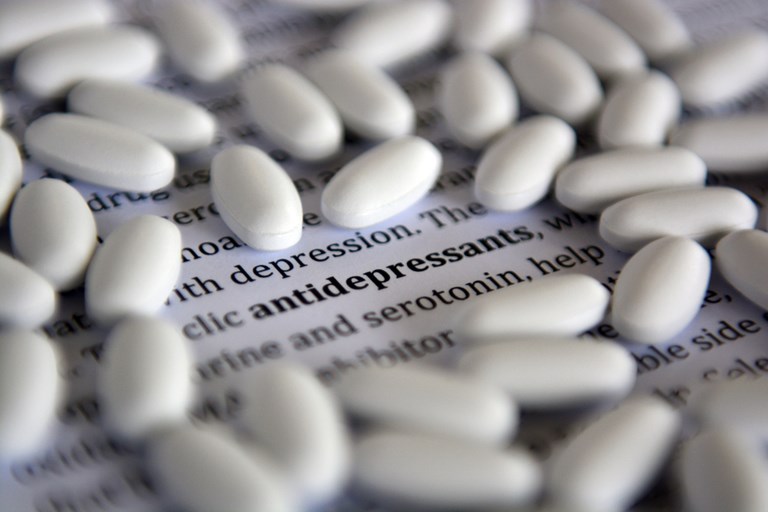What are antidepressants
Antidepressants are psychiatric drugs which are permitted to treat depression. Some are also permitted to treat other illnesses, such as:
- anxiety disorders
- phobias
- bulimia (an eating disorder)
- several physical conditions, such as managing long-term pain.
How antidepressants work
Antidepressants are prescribed to treat the symptoms of depression, anxiety or other mental health issues. Doctors will often prescribe them alongside a talking therapy, to help deal with the causes of your mental health problems. Some antidepressants work better for some people more than others, it's worth discussing your symptoms with your Doctor to find the right one for you.
Types of antidepressants
There are many various types of antidepressant. All types have similar effects and work on the same brain chemicals, however some people may react to certain antidepressants better than others. Additionally the different types of medication may cause different side effects.
The different types are:
- selective serotonin reuptake inhibitors (SSRIs)
- serotonin and noradrenaline reuptake inhibitors (SNRIs)
- tricyclics and tricyclic-related drugs
- monoamine oxidase inhibitors (MAOIs)
- other antidepressants

Common Antidepressants and Anxiety Medication
Anxiety and depression are conditions which we commonly dispense prescriptions for. Some of the common treatments used are:
Sertraline
Sertraline is a prescription-only antidepressant which around 8% of our patients are prescribed. It’s classed as a ‘selective serotonin reuptake inhibitor’ (SSRI), and is used in the treatment of depression and anxiety disorders. It works by increasing levels in the brain of the chemical messenger serotonin. Sertraline is also used to treat panic attacks, obsessive compulsive disorder (OCD), and post traumatic stress disorder (PTSD). Sertraline comes in tablet form, and since lockdown started Pharmacy2U has dispensed it over 100,000 times.
Nausea (feeling sick) is the most common side effect of taking Sertraline. Other common side effects can include difficulty sleeping, and headaches.
The typical starting dose for adults who are prescribed Sertraline for an anxiety-related condition is 25mg once a day, increasing to 50mg after a week. If the doctor considers it appropriate, the daily dose can be increased up to a maximum of 200mg a day.
Amitriptyline
Amitriptyline is a prescription-only medicine which around 4% of our patients are prescribed. It’s classed as a “tricyclic antidepressant” and can be used to help treat depression and low mood – as well as a number of other conditions, such as nerve pain, and preventing migraines. It comes in tablet and liquid forms. It has been around for longer than the other medicines mentioned here, but it is still one of the most effective options for certain patterns of symptoms.
Common side effects, which can include a dry mouth and constipation, are normally mild and should resolve within a couple of weeks. It should be taken with water to avoid a bitter taste, and as it can cause drowsiness, it’s best to take it in the evenings. If the drowsiness persists into the next morning, it could be taken slightly earlier in the evening.
In the management of depression, the usual daily dose of Amitriptyline is between 50mg to 100mg. This can be increased up to 200mg daily if the doctor considers it necessary.
Citalopram
Citalopram is a prescription-only antidepressant which around 6% of our patients are prescribed. It’s also a selective serotonin reuptake inhibitor (SSRI), like Sertraline, and is used to treat depression and panic attacks by increasing the levels of serotonin in the brain. It comes in tablet and liquid forms and generally has fewer unwanted side effects than many of the older antidepressants such as Amitriptyline.
Common side effects can include a dry mouth, sweating, and tiredness.
It’s taken once a day and the typical starting dose for an adult is 20mg daily. The maximum daily dose of citalopram is 40mg daily.
Things to consider when taking all these medicines
With all of these medicines, it can take between 4 to 6 weeks before you will notice any benefit. Your doctor and pharmacist will check if you’re taking any other medicines that could clash with them, and you should also tell them if you take any herbal or over-the-counter medicines before you start a course of any new medicine.
As with any medicine, there’s a chance that you may experience side effects. Typically, side effects are related to the dosage you’re taking and they may subside with continued treatment. If you experience any unpleasant side effects or are unsure if the medicine is helping, talk to your doctor or pharmacist. You can report side effects to the Yellow Card Scheme which helps the Government’s medicines safety agency ensure safety concerns are identified, collated and addressed. If you feel that you want to stop taking any medicine for anxiety or depression, you should talk to your doctor first, as you will usually be advised to taper down the dosage gradually, and your doctor will tell you the best way to do this.
Get the medicine you need delivered by Pharmacy2U
Our team of qualified UK-based pharmacists can work with your GP to get the medication you need, delivered. Pharmacy2U are paid less in fees by the
NHS than an average high street pharmacy.
Since lockdown began, we’ve been paid £110,363 less by the NHS for prescriptions for anxiety and depression, which is just part of the £8 million we’ve been paid less since 2014, thanks to all our patients. To find out more about how we can help you or your friends and family with long term health conditions, check our NHS Repeat Prescription Service and our Online Doctor.
